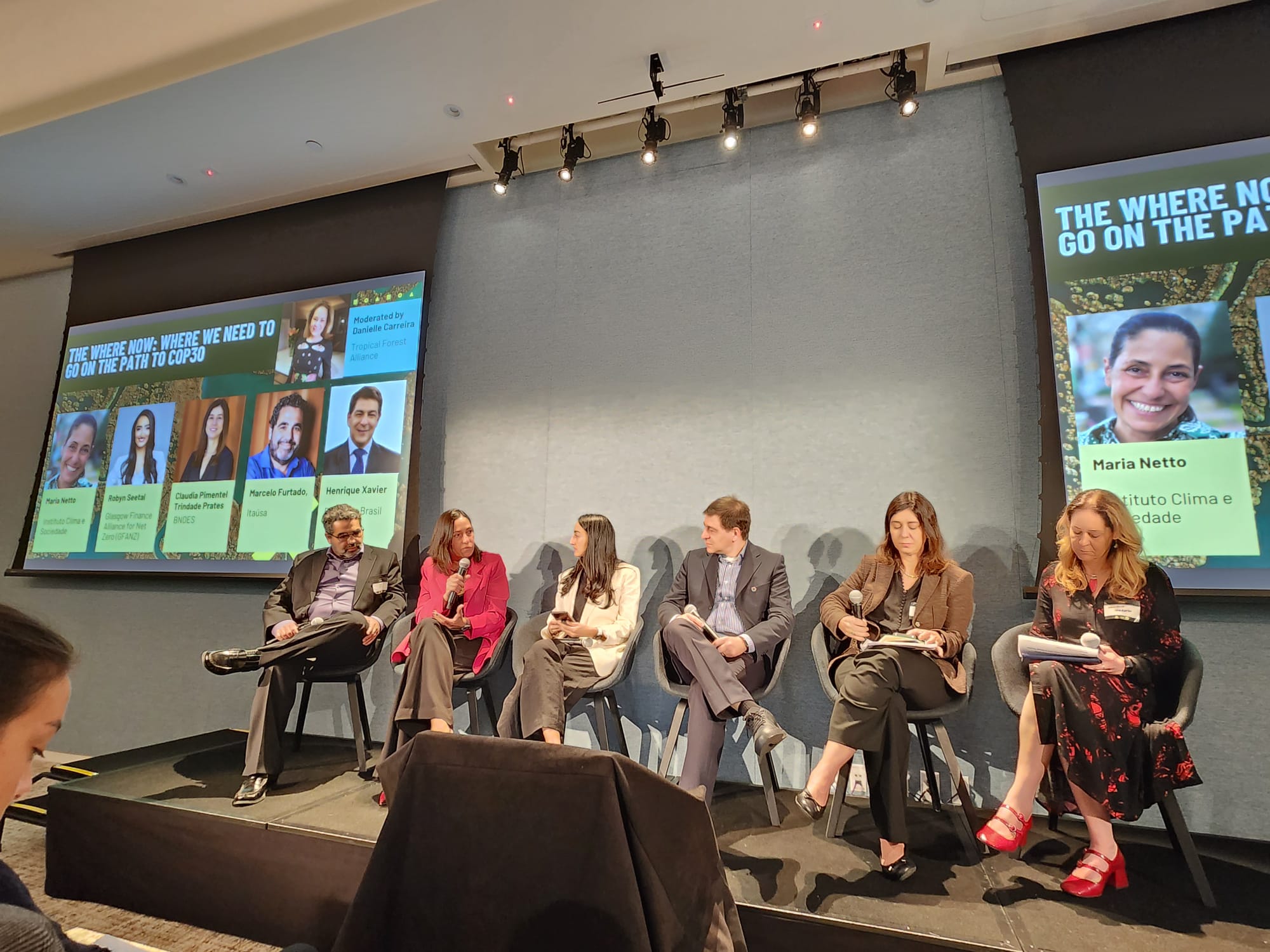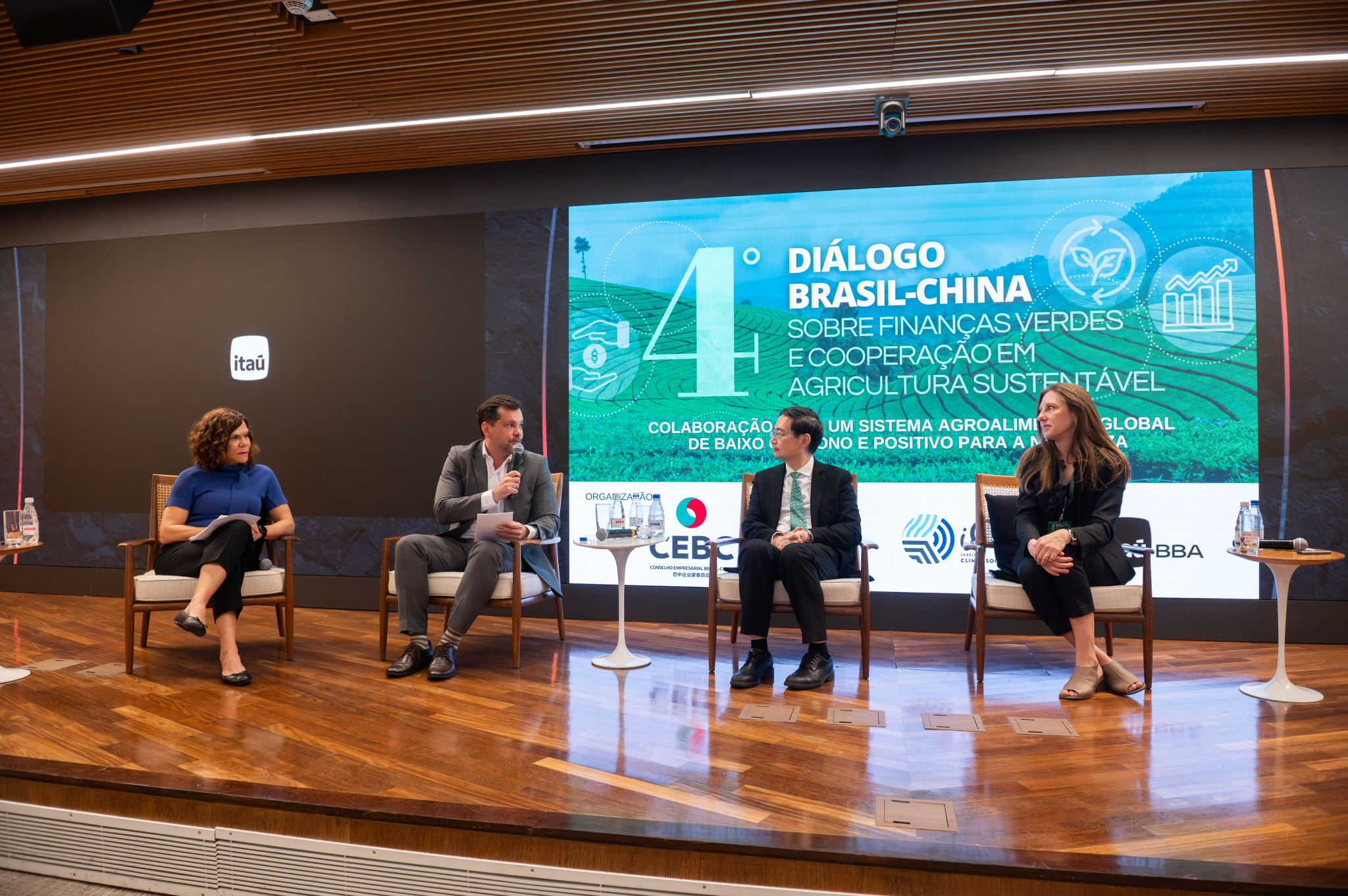iCS and partners launch an innovative investment lab for nature-based solutions during Climate Week

iCS and partners launch an innovative investment lab for nature-based solutions during Climate Week
In addition to the launch of the Nature Investment Lab, other events were co-organized by the Institute and its partners
The Institute for Climate and Society (iCS), the Banco do Brasil (BB), the National Bank for Economic and Social Development (BNDES), the Glasgow Financial Alliance for Net Zero (GFANZ) and the Itaúsa Institute launched the Nature Investment Lab (NIL) during New York Climate Week 2024. The Lab will address the current challenges in the financing and sizing of nature-based solutions (NbS) in order to mitigate greenhouse gas emissions from agriculture and livestock and other land uses in Brazil.
For Maria Netto, the executive director of iCS, by bringing together leaders from the public, private and philanthropic sectors and civil society, “the project aims to create an environment that is conducive to boosting investments in the restoration, bioeconomy and regenerative agriculture projects in Brazil, unlocking new business and opportunities aligned to the climate.”
“Without taking care of nature, we will not be able to achieve the goal of the Paris Agreement of limiting global warming to 1.5 °C above pre-industrial levels,” said Maria Netto. According to Maria, Brazil has the conditions to lead the promotion of an agenda of Nature-Based Solutions (NbS). “We believe that the agenda of nature-based solutions is one of the great advantages of Brazil for COP30. According to the IPCC, more than 30% of the potential to reduce the emissions needed to arrive at the stabilization point of 1.5 °C must come from these solutions,” added Maria Netto.
According to Maria Netto, NIL should start operating in October. “We expect that every six months we will have very specific outputs from the laboratory, including reforms in the financial regulation that facilitate mechanisms for mixing blended finance resources, reducing the transaction costs of these restoration, bioeconomy and regenerative agriculture projects and creating a space to unlock projects that are already sufficiently mature but are having difficulty in accessing resources.”
One of the parallel events to the UN General Assembly, Climate Week NYC (CW) brought together business leaders, government authorities, decision-makers and representatives from civil society from various segments in the American city. The objective was to take advantage of the meeting of the high-level delegations in the city in order to coordinate and discuss solutions to combat climate change, some of which are already underway, with a focus on the COP29 negotiations, which will take place in Baku, Azerbaijan, in November.
In addition to the launch of NIL, iCS and its partners made other contributions towards the implementation of a more ambitious climate agenda. The Institute co-organized other events and also participated in panels and activities throughout the week.
On September 22, the event Navigating to COP 29 and the Road to Belém (available in English) provided two panels focused on the critical aspects of climate action and climate financing, discussing the main themes, challenges and opportunities for COPs 29 and 30. Co-organized by iCS, Laclima and NYU, the panels were attended by representatives from the Inter-American Development Bank, the United Nations Framework Convention on Climate Change (UNFCCC), the Ministry of Foreign Affairs, the Brazilian Center for International Relations (CEBRI) and the NDC Partnership.
On September 24, iCS, together with the Arapyaú Institute and Uma Concertação pela Amazônia, held a meeting with civil society to discuss connections between the climate, science and politics and the roads to COP30. The event Climate Politics and Climate Science: The road to COP30, held at the New York University, was attended by the National Secretary for Climate Change, Ana Toni, the Brazilian ambassador André Corrêa do Lago, and the scientist Johan Rockström, from the Potsdam Institute for Climate Impact Research.
Also on September 24, iCS and the Global Strategic Communications Council (GSCC) co-organized the dinner Women Rewrite the Narrative: The Role of Financing in Delivering Climate Action. The event brought together senior women leaders from the climate and finance sectors to explore the opportunities in relation to climate financing and the role of women in the rewriting of its narrative.
On September 25, iCS also supported, together with Conservation International, The Nature Conservancy (TNC), the World Wildlife Fund (WWF) and the Wildlife Conservation Society (WCS), the promotion of the debate about the development of the Tropical Forest Forever Facility (TFFF), which is a financial mechanism proposed by the Brazilian government during COP 28, in Dubai, in 2023. Among the participants were the Minister for the Environment and Climate Change, Marina Silva, and representatives from the governments of Colombia and the United States.
“The TFFF is innovative because it is a low-risk investment that generates returns for the investor and for approximately 70 developing countries. The instrument seeks to recompense these countries for the maintenance of the tropical forests and serves as a financial incentive to expand these areas worldwide,” said Maria. iCS acts as a coordinator to bring different stakeholders to the debate, such as philanthropists, civil society organizations and different types of investors, at a domestic and international level,” explained Maria Netto, the executive director of iCS.
For Netto, the recognition that the climate, biodiversity and nature cannot be seen as separate items was one of the highlights of the week: “It is bringing nature into the discussion as a solution to combat climate change.”
Grantees from the Institute also participated in their own events, debates and high-level coordinations. The following were present at Climate Week 2024: Cátedra Josué de Castro de Sistemas Alimentares Saudáveis e Sustentáveis, the Brazil Climate Center, the Brazilian Coalition on Climate, Forests and Agriculture, FGVces, the Arapyaú Institute, the E+ Energy Transition Institute, the International Institute for Sustainability (IIS) and the CIPÓ Platform.


The road to COP30, hosted by iCS, the Arapyaú Institute, and Uma Concertação pela Amazônia. Credit – Luciana Rosa – iCS

Thais Ferraz at Food Day. Credit – Press

Panel by Cebri and Laclima, supported by iCS, featured prominent figures during discussions on the first day of Climate Week. Credit – Cebri Press

NIL was launched during the Climate Week Credit: Arturo Cubría/Climate Champions and Disclosure Casa da Amazônia NYC


